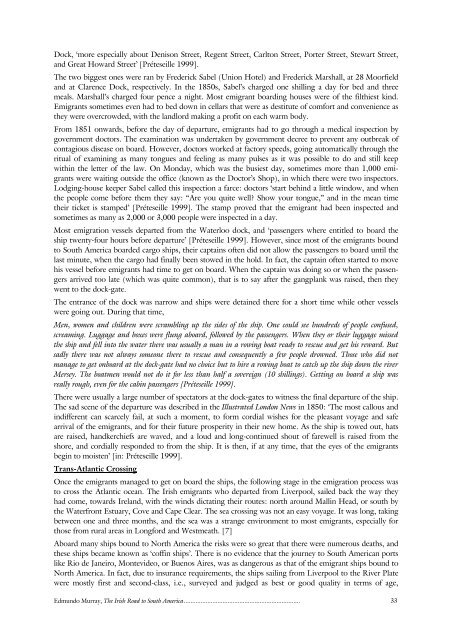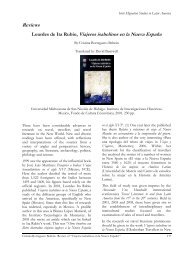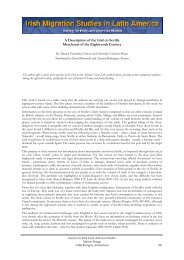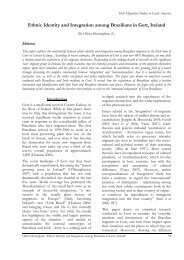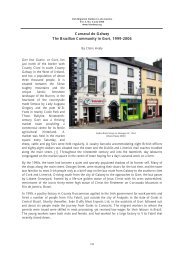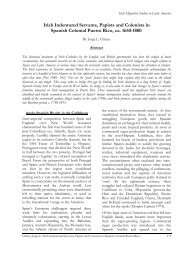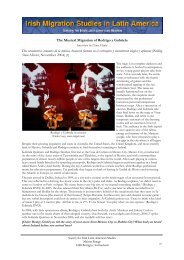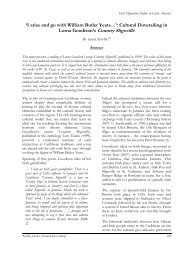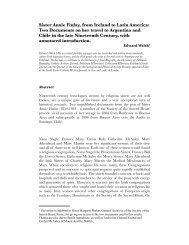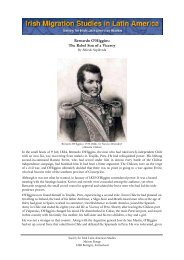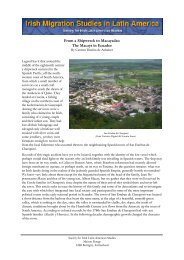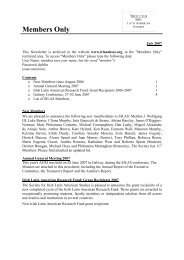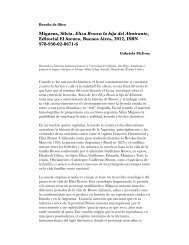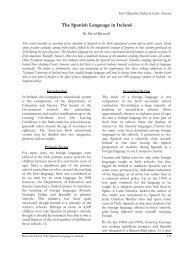I:6 Anti-dumping - Society for Irish Latin American Studies
I:6 Anti-dumping - Society for Irish Latin American Studies
I:6 Anti-dumping - Society for Irish Latin American Studies
You also want an ePaper? Increase the reach of your titles
YUMPU automatically turns print PDFs into web optimized ePapers that Google loves.
Dock, ‘more especially about Denison Street, Regent Street, Carlton Street, Porter Street, Stewart Street,<br />
and Great Howard Street’ [Préteseille 1999].<br />
The two biggest ones were ran by Frederick Sabel (Union Hotel) and Frederick Marshall, at 28 Moorfield<br />
and at Clarence Dock, respectively. In the 1850s, Sabel’s charged one shilling a day <strong>for</strong> bed and three<br />
meals. Marshall’s charged four pence a night. Most emigrant boarding houses were of the filthiest kind.<br />
Emigrants sometimes even had to bed down in cellars that were as destitute of com<strong>for</strong>t and convenience as<br />
they were overcrowded, with the landlord making a profit on each warm body.<br />
From 1851 onwards, be<strong>for</strong>e the day of departure, emigrants had to go through a medical inspection by<br />
government doctors. The examination was undertaken by government decree to prevent any outbreak of<br />
contagious disease on board. However, doctors worked at factory speeds, going automatically through the<br />
ritual of examining as many tongues and feeling as many pulses as it was possible to do and still keep<br />
within the letter of the law. On Monday, which was the busiest day, sometimes more than 1,000 emigrants<br />
were waiting outside the office (known as the Doctor’s Shop), in which there were two inspectors.<br />
Lodging-house keeper Sabel called this inspection a farce: doctors ‘start behind a little window, and when<br />
the people come be<strong>for</strong>e them they say: “Are you quite well? Show your tongue,” and in the mean time<br />
their ticket is stamped’ [Préteseille 1999]. The stamp proved that the emigrant had been inspected and<br />
sometimes as many as 2,000 or 3,000 people were inspected in a day.<br />
Most emigration vessels departed from the Waterloo dock, and ‘passengers where entitled to board the<br />
ship twenty-four hours be<strong>for</strong>e departure’ [Préteseille 1999]. However, since most of the emigrants bound<br />
to South America boarded cargo ships, their captains often did not allow the passengers to board until the<br />
last minute, when the cargo had finally been stowed in the hold. In fact, the captain often started to move<br />
his vessel be<strong>for</strong>e emigrants had time to get on board. When the captain was doing so or when the passengers<br />
arrived too late (which was quite common), that is to say after the gangplank was raised, then they<br />
went to the dock-gate.<br />
The entrance of the dock was narrow and ships were detained there <strong>for</strong> a short time while other vessels<br />
were going out. During that time,<br />
Men, women and children were scrambling up the sides of the ship. One could see hundreds of people confused,<br />
screaming. Luggage and boxes were flung aboard, followed by the passengers. When they or their luggage missed<br />
the ship and fell into the water there was usually a man in a rowing boat ready to rescue and get his reward. But<br />
sadly there was not always someone there to rescue and consequently a few people drowned. Those who did not<br />
manage to get onboard at the dock-gate had no choice but to hire a rowing boat to catch up the ship down the river<br />
Mersey. The boatmen would not do it <strong>for</strong> less than half a sovereign (10 shillings). Getting on board a ship was<br />
really rough, even <strong>for</strong> the cabin passengers [Préteseille 1999].<br />
There were usually a large number of spectators at the dock-gates to witness the final departure of the ship.<br />
The sad scene of the departure was described in the Illustrated London News in 1850: ‘The most callous and<br />
indifferent can scarcely fail, at such a moment, to <strong>for</strong>m cordial wishes <strong>for</strong> the pleasant voyage and safe<br />
arrival of the emigrants, and <strong>for</strong> their future prosperity in their new home. As the ship is towed out, hats<br />
are raised, handkerchiefs are waved, and a loud and long-continued shout of farewell is raised from the<br />
shore, and cordially responded to from the ship. It is then, if at any time, that the eyes of the emigrants<br />
begin to moisten’ [in: Préteseille 1999].<br />
Trans-Atlantic Crossing<br />
Once the emigrants managed to get on board the ships, the following stage in the emigration process was<br />
to cross the Atlantic ocean. The <strong>Irish</strong> emigrants who departed from Liverpool, sailed back the way they<br />
had come, towards Ireland, with the winds dictating their routes: north around Mallin Head, or south by<br />
the Waterfront Estuary, Cove and Cape Clear. The sea crossing was not an easy voyage. It was long, taking<br />
between one and three months, and the sea was a strange environment to most emigrants, especially <strong>for</strong><br />
those from rural areas in Long<strong>for</strong>d and Westmeath. [7]<br />
Aboard many ships bound to North America the risks were so great that there were numerous deaths, and<br />
these ships became known as ‘coffin ships’. There is no evidence that the journey to South <strong>American</strong> ports<br />
like Rio de Janeiro, Montevideo, or Buenos Aires, was as dangerous as that of the emigrant ships bound to<br />
North America. In fact, due to insurance requirements, the ships sailing from Liverpool to the River Plate<br />
were mostly first and second-class, i.e., surveyed and judged as best or good quality in terms of age,<br />
Edmundo Murray, The <strong>Irish</strong> Road to South America..................................................................... 33


